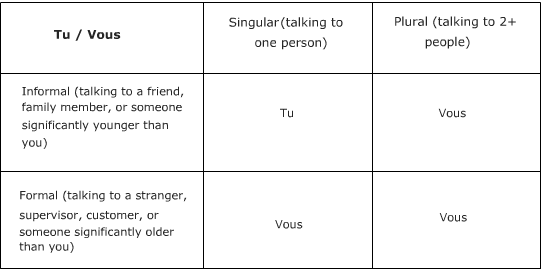Subject Pronouns in French: The Basics
We use subject pronouns to talk about someone without using their name, or to avoid being redundant. In English, the subject pronouns are I, you, we, they, he, she, and it. Every English sentence must have a subject, so we use these words quite often.
The subject pronouns are still very important in French.
Let's see what the subject pronouns are in French.
I = Je
This one is easy - if you're talking about yourself, use Je.
You = Tu or Vous

He = Il
She = Elle
It = Il/Elle [something]
Because every noun has a gender in French, you will use il to say "it" for masculine items, and elle to say "it" for feminine items. If you're using the "impersonal it" to make a general comment like "It's hot today", you don't need to include a subject at all (i.e. Il fait chaud aujourd'hui)
We = Nous
They = Ils/Elles
Like with il/elle (it), you have to distinguish by gender when you say "they." If it is a group of all females, use elles. Otherwise, use ils.
In French, we also have the pronoun on that has conjugation than il and elle. It can refer to:
*people:
Dans ce village, on croit encore aux légendes. (In this country, people still believe in legends.)
*all the world:
On doit respecter ses parents. (We have to respect our parents.)
*nous (us):
On arrivera demain. (We will arrive tomorrow.)
*one or more indeterminate person:
On frappe à la porte. (Someone is knocking on the door.)
The subject pronouns are still very important in French.
Let's see what the subject pronouns are in French.
I = Je
This one is easy - if you're talking about yourself, use Je.
You = Tu or Vous

He = Il
She = Elle
It = Il/Elle [something]
Because every noun has a gender in French, you will use il to say "it" for masculine items, and elle to say "it" for feminine items. If you're using the "impersonal it" to make a general comment like "It's hot today", you don't need to include a subject at all (i.e. Il fait chaud aujourd'hui)
We = Nous
They = Ils/Elles
Like with il/elle (it), you have to distinguish by gender when you say "they." If it is a group of all females, use elles. Otherwise, use ils.
In French, we also have the pronoun on that has conjugation than il and elle. It can refer to:
*people:
Dans ce village, on croit encore aux légendes. (In this country, people still believe in legends.)
*all the world:
On doit respecter ses parents. (We have to respect our parents.)
*nous (us):
On arrivera demain. (We will arrive tomorrow.)
*one or more indeterminate person:
On frappe à la porte. (Someone is knocking on the door.)
|
Related Links: French Telling Time in French Verbs classification in French |
To link to this Subject Pronouns in French: The Basics page, copy the following code to your site:
